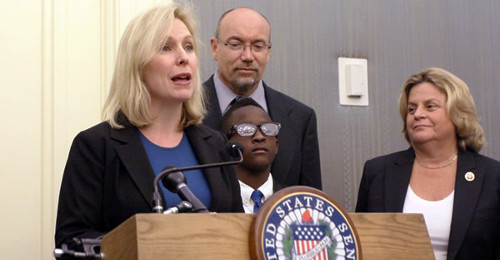BY CHRIS JOHNSON, WASHINGTON BLADE

Sen. Kirsten Gillibrand has filed an amendment against President Trump's transgender military ban. (Washington Blade file photo by Damien Salas)
Sen. Kirsten Gillibrand (D-N.Y.) filed an amendment Monday before the U.S. Senate that would undermine President Trump's ban on transgender military service and could see a vote as soon as this week.
The two-page amendment, co-sponsored by Sen. Susan Collins (R-Maine), was filed for consideration as part of the fiscal year 2018 defense authorization bill. The amendment was obtained late Monday by the Washington Blade.
Gillibrand said in a statement the amendment would honor transgender service members currently serving in the armed forces.
"Any individual who wants to join our military and meets the standards should be allowed to serve, period. Gender identity should have nothing to do with it," Gillibrand said. "I am proud to work with Sen. Collins to introduce our bipartisan amendment to protect transgender members of our Armed Forces, and I will always fight for our brave transgender troops who put their lives on the line to protect our country."
Both Gillibrand and Collins championed efforts in 2010 for legislative repeal of "Don't Ask, Don't Tell." They both were among the 45 senators who signed a letter to Defense Secretary James Mattis urging him to resist Trump's plan to bar transgender people from the U.S. military.
Collins, the lead Republican in efforts to repeal "Don't Ask, Don't Tell," also expressed support for transgender troops in a statement.
"Our armed forces should welcome the service of any qualified individual who is willing and capable of serving our country," Collins said. "If individuals are willing to put on the uniform of our country, be deployed in war zones, and risk their lives for our freedoms, then we should be expressing our gratitude to them, not trying to exclude them from military service."
The amendment, which responds to President Trump's memo late last month directing the Pentagon to ban transgender people from the armed forces, consists of three parts.
The first part expresses the sense of Congress, which isn't binding under the law, that "individuals who are qualified and can meet the standards to serve in the military should be eligible to serve."
The second part addresses what will happen to transgender people currently in the military who came out after the Obama administration lifted the ban on transgender service and are now facing potential expulsion after Trump directed the U.S. military to the reinstate the policy.
Under the amendment, a service member "may not be involuntarily separated from the Armed Forces, or denied reenlistment or continuation in service in the Armed Forces, solely on the basis of the member's gender identity."
The third part of the amendment codifies the study announced June 30 by Defense Secretary James Mattis on the impact of new enlistments of transgender people in the armed forces. The amendment sets a deadline for completing that study on Dec. 31 and directs the Pentagon to send Congress a report on that study no later than Feb. 21.
However, the amendment stops short of directing the Pentagon to accept transgender people into the armed forces, putting off the decision on whether that will happen until the completion of the study.
Aaron Belkin, director of the San Francisco-based Palm Center, endorsed the Gillibrand measure in a statement as means to "enhance military readiness."
"Legislative action now would prevent uncertainty and disruption following from a ban and save money that would be wasted recruiting and training replacements," Belkin said. "Many Republican leaders have made statements in support of transgender troops defending our nation, including Sens. McCain, Collins, Murkowski, Hatch, Portman, Ernst, Tillis, Heller, Johnson, Toomey, Gardner, Shelby and Sullivan, and 56 retired generals and admirals have said that reinstating the transgender ban would degrade readiness."
Nowhere mentioned in the amendment is U.S. military funding for gender reassignment surgery. It seems that even if the amendment became law, the portion of Trump's ban that would end government funding for that procedure would be allowed to stand.
The absence of that language is likely an attempt to win support from Senate Republicans who objected to Trump's policy, but withheld support for military funds for transition-related health care.
It remains to be seen whether Senate leadership will reach an agreement to allow a vote on the Gillibrand amendment. The Senate was set to vote on proceeding with debate on the defense authorization bill at the time of this posting.
Lawmakers were considering last week language for an amendment against Trump's transgender military ban. Whether or not the amendment will obtain a vote is likely up to Sen. John McCain (R-Ariz.), who as chair of the Senate Armed Services Committee has considerable sway over the defense authorization bill.










